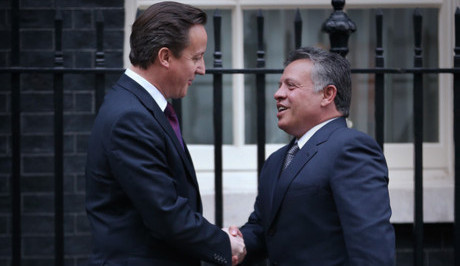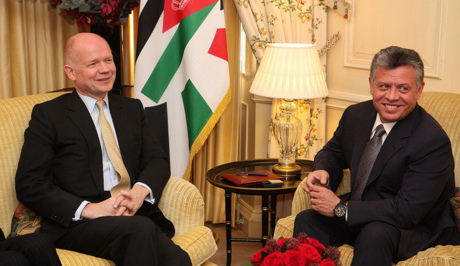13th December 2012
Don’t Make the Whole World Blind
His Majesty King Abdullah is in London this week. A top priority in his talks with Prime Minister David Cameron and Foreign Secretary William Hague was the Middle East Peace Process.

After HM King Abdullah’s trip to Ramallah last week; after the ceasefire in Gaza; and after the vote at the UN General Assembly, this long-standing issue has again surfaced as a top priority.
Sometimes, when I talk to people about the peace process, I get asked “what peace?” and “what process?” I can understand people’s scepticism and their feeling that diplomats prefer theory to reality and perhaps fail to grasp fully where the parties to a conflict are coming from.
In other conflicts I have argued for the basic factors of conflict resolution theory: the need to compromise, to avoid the blame game and to build confidence between people.
But I also know that people at the heart of a conflict have heard all these words before. What they really want to know is what is new. And what we’re going to do about it.
They want peace and stability to get on with their lives. They want the dignity of being able to put bread on their family’s table, educate their children and look forward to a prosperous future.
Disputes between people, races and countries are a natural human instinct. The people involved have choices but it is important to resolve disputes through dialogue not force. Conflict is inevitable; combat is optional.
That is why our message over the last few days to both the Israelis and the Palestinians has been to renew the dialogue urgently and without preconditions.

William Hague and HM King Abdullah agreed on the need for a new initiative as a matter of urgency. Our fear is that the window will close on a two-state solution because of changes on the ground, notably illegal settlement building.
In recent days, William Hague has underlined our commitment to a viable and sovereign Palestinian state living in peace and security alongside Israel.
The guiding principles of the UK’s approach will be to ensure the return to credible negotiations in order to secure a two-state solution based on 1967 borders, with agreed land swaps, with Jerusalem as the shared capital of both states and with a just agreement for refugees.
No-one is pretending that this will be easy. It will require patience and resilience in the face of apathy, obduracy and hostility. But there is no alternative to a solution through dialogue. As Gandhi put it succinctly “An eye for a eye will only make the whole world blind.”
Dear Peter, your report impressed me a lot. So pls. let me start with sthg. positive. I think that the visit of His Majsty King Abdullah II to London and these negotiations/talks with PM David Cameron and FS William Hague are at least one of the few but good steps forward into a peace-direction. As long as all sides are honestly willing to discuss, to talk with each other the chances for a peacefully soluton are increasing.To me and because of well known hiatorical reasons only Great Britain has the key to open this doo to tis so-called “Roadmap to Peace”. The ceasefire in Gaza is for me just one of several conditions. I also do understand all these people- full of “scpticism”. But next steps down would only be more desparation and hate.Here in Stuttgart, there ´s a wise saying: “Wem dass Wassr bis zum Halse steht- darf nie den Kopf hängen lassen….even if the water is already at your neck – keep stiff upper lip and your head clear , dry and full of hope.” So you are surely right by writing:” Disputes between people, races and countries are a natural human instinct”. But pls. allow me to add: The human instinct plus humanity and the wish to live in peace are are much stronger. That ´s why I do also agree that the best solution is this “Two-States- One”.
Bw + a peacefull new year 2013. Ingo-Steven Wais, Stuttgart